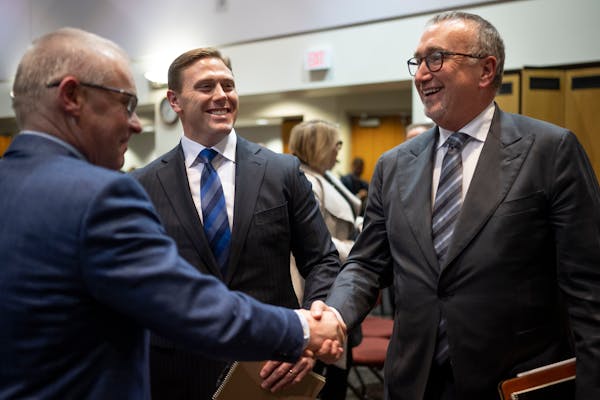Bemidji residents voiced strong support and, in some cases, spirited opposition Tuesday night for Sanford Health and its proposed mega-merger with Fairview Health Services — reflecting how hospitals can deeply influence life in smaller communities.
About two-thirds of speakers lauded the South Dakota-based health system and said Sanford has made good on commitments to north-central Minnesota since it took over the town's hospital in 2011.
There were dissenting voices, however, including concerns about Sanford's approach to labor unions as well as questions about the merger impacts on health care costs and choice.
The comments came during the second of four public meetings across the state held by Minnesota Attorney General Keith Ellison.
"We expect that this merger could be moving forward as early as March 31," Ellison said at the conclusion of the meeting at Bemidji State University. "It's a fairly quick timeline."
During the past week, the merger debate has centered on ties between the University of Minnesota and Minneapolis-based Fairview, which acquired the U's teaching hospital in 1997.
The U has not supported the merger proposal, prompting Sanford to say the university should consider repurchasing the University of Minnesota Medical Center. The university subsequently proposed taking back the hospital as a first step toward a new $1 billion-plus medical center on its East Bank campus.
The focus Tuesday, however, was Sanford's impact on Bemidji and the surrounding region.
In 2011, Sanford combined with North Country Health Services, a nonprofit that ran Bemidji's independent hospital. Sanford, which also is a nonprofit, has since invested more than $100 million to expand health care services in the community.
Sanford now is the region's largest employer and provides "metro-level standards of living" to about 2,200 families in the area, said David Hengel, executive director of Greater Bemidji, a nonprofit that promotes economic development.
The health system has been a model corporate citizen with substantial financial contributions to the community, Hengel said, while also playing a pivotal role in regional economic development initiatives.
At first, Bemidji leaders and residents felt uncertain about Sanford taking over its town hospital, he said, much as people in the Twin Cities might feel today. But the health system has "far exceeded" the commitments it initially made to Bemidji, Hengel said.
Since 2012, the number of clinicians at the local hospital has grown to 108, an increase of nearly 50%, said Sylvia Wilgen, a resident and long-time volunteer at North Country and now Sanford. Before the merger, hiring health care professionals was a struggle, she said.
"I feel the proposed merger … would be a positive force for recruiting top-tier clinicians to our state," Wilgen said.
Resident Julie Laitala said she appreciated how her family members have had better access to specialty health care with Sanford Health. Her mom not only could stay in Bemidji for cancer treatment, Laitala said, but she also opted to return from Florida for cardiac care because she trusted Sanford doctors.
Johnna Nynas, an obstetrician and gynecologist, said Sanford has helped maintain maternity care as those units have shut down in other rural hospitals. The health system has provided money, she said, to specifically address disparate health outcomes among rural and Native American women.
While speakers at last week's public meeting in St. Paul questioned whether mental and behavioral health care in the Twin Cities would get worse with the merger, Bemidji residents lauded Sanford for investing in the critical services.
With a new a crisis center and other developments in and around the hospital campus, Sanford has helped law enforcement better respond to patients with unaddressed behavioral health issues, said Phil Hodapp, the recently retired sheriff of Beltrami County.
"I cannot overstate enough the importance of the Sanford Health partnerships," said Kay Mack, the recently retired Beltrami County administrator who spent years as a countywide elected official. Referring to a mental health collaboration in the region, Mack said: "In no way could we have achieved the level of services that were created without the huge investment that has been made by Sanford."
But about one-third of those speaking Tuesday night raised concerns with Sanford and argued against the merger.
Patients in northern Minnesota already have limited options in health care, and choice will diminish further with a Sanford-Fairview combination, said Darrell Seki, chairman of the Red Lake Tribal Council.
Seki played a recording of a Sanford Bemidji nurse making offensive and degrading comments about Native Americans, including those in nearby tribal communities. He said the recorded comments were an outrage and have raised concerns about whether more workers at Sanford are biased against the Native population, a group that already suffers from harmful gaps in health care outcomes.
"This should not happen to Native Americans," Seki said, saying he recently sent a letter about the incident to Sanford executives. "The merger should not happen."
Two Sanford employees responded during the meeting by saying the recorded comments clearly were wrong but also didn't represent the views of others at Sanford.
"I heard that just ghastly video," said Dr. Jason Caron, an orthopedic surgeon at Sanford Bemidji who grew up in the community. "I believe that what Darrell said is right: We're all born in the same way. … Sanford is not a place that's racist."
Members of the Minnesota Nurses Association currently are negotiating a contract with Sanford in Bemidji and they're concerned the health system hasn't agreed to language for post-merger recognition of any new agreement, said nurse Jessica Mistic.
The issue has led one nurse to allege the combination is a "sleazy ploy to eradicate our union from hospitals," said Jeanne Forman, a retired nurse from Minneapolis, who read comments at the meeting from two nurses who wanted to remain anonymous.
"I'm also confused as to how people aren't seeing this as a total monopoly," Forman quoted the nurse as saying.
Ann Schwagerl, a vice president of the Minnesota Farmers Union, said her members believe the merger will raise costs and reduce access to quality health care, particularly in rural communities.
"We've seen enough consolidation," Schwagerl said. "Rural Minnesota already has one of the most consolidated markets in the country, and this merger will give one company control over a fifth of our state's hospitals."
Joe Gould, a newly elected county commissioner in Beltrami County, said Sanford has been great for the local economy, but he cautioned that consolidation often leads to higher costs with no quality gains and fewer choices. Gould said he was not representing the views of the county or the county board.
Sanford and Fairview executives have pledged to control costs while expanding access with the merger. James Hereford, the Fairview CEO, said during Tuesday's meeting that both health systems "have long had unionized workforces in Minnesota."
Bill Gassen, the chief executive at Sanford Health, said during the meeting that "time is of the essence" for getting the combination done.
"Every day we wait is a missed opportunity," Gassen said, "to realize the benefits for our patients, our people and our communities,."

Minnesota Department of Health rescinds health worker layoffs

Eco-friendly house on 30 acres near Marine on St. Croix listed at $1.6M

DOGE cuts federal money for upgrades at Velveeta plant in New Ulm

